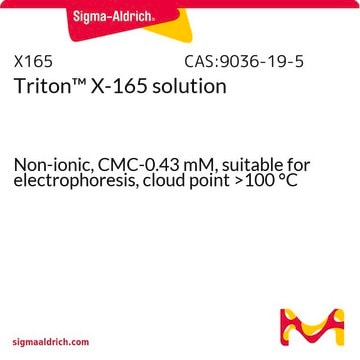X305
Triton™ X-305 solution
70% in H2O
Synonym(s):
Polyethylene glycol mono(4-tert-octylphenyl) ether, Polyethylene glycol p-octylphenol ether
About This Item
Recommended Products
description
non-ionic
Quality Level
mol wt
~1526.0 g/mol
concentration
70% in H2O
technique(s)
blocking: suitable
cell culture | mammalian: suitable
hybridization: suitable
immunohistochemistry: suitable
protein purification: suitable
CMC
0.65 mM
transition temp
cloud point >100 °C
HLB
17.3
InChI
1S/C16H26O2/c1-15(2,3)12-16(4,5)13-6-8-14(9-7-13)18-11-10-17/h6-9,17H,10-12H2,1-5H3
InChI key
JYCQQPHGFMYQCF-UHFFFAOYSA-N
Looking for similar products? Visit Product Comparison Guide
Related Categories
General description
Application
- In the treatment of cells for immunocytochemistry
- Along with peroxotungstic acid in the preparation of tungsten trioxide films by sol-gel method
- In the dispersion polymerization of styrene with activated poly(N-vinylpyrrolidone) (PVP) for the synthesis of lanthanide-encoded polystyrene particles
Legal Information
Signal Word
Danger
Hazard Statements
Precautionary Statements
Hazard Classifications
Acute Tox. 4 Oral - Aquatic Acute 1 - Aquatic Chronic 1 - Eye Dam. 1 - Skin Irrit. 2
Storage Class Code
10 - Combustible liquids
WGK
WGK 2
Flash Point(F)
483.8 °F - closed cup
Flash Point(C)
251 °C - closed cup
Personal Protective Equipment
Choose from one of the most recent versions:
Certificates of Analysis (COA)
Don't see the Right Version?
If you require a particular version, you can look up a specific certificate by the Lot or Batch number.
Already Own This Product?
Find documentation for the products that you have recently purchased in the Document Library.
Customers Also Viewed
Our team of scientists has experience in all areas of research including Life Science, Material Science, Chemical Synthesis, Chromatography, Analytical and many others.
Contact Technical Service








